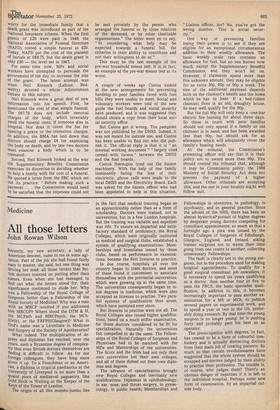Medicine
All those letters
John Rowan Wilson
Recently, my new secretary, a lady of American descent, came to me in some agitation. Part of the job she had found fairly easy to master, she said, but one thing was driving her mad: all those letters that British doctors insisted on putting after their names. Even when she had managed to find out what the letters stood for, their Significance continued to elude her. Why Was a Fellowship of the Royal College of Surgeons better than a Fellowship of the Royal Society of Medicine? Why was a man With an MRCP insulted if you addressed him MRCGP? Where stood the DTM & H, the MCPath and MRCPsych, the MCh(Orth), or the FRFPS(Glasgow)? What in God's name was a Licentiate in Medicine and Surgery of the Society of Apothecaries?
What indeed. The multiplication of degrees and diplomas has reached, over the Years, such a Byzantine degree of complexity that even British doctors themselves are finding it difficult to follow. As for our foreign colleagues, they have long since given it up. To a Frenchman or an American, a diploma in tropical paediatrics at the University of Liverpool is no more than a quaint piece of mediaeval pageantry, like Gold Stick in Waiting or the Keeper of the ReYs of the Tower of London.
The origin of all this mumbo-jumbo lies in the fact that medical training began as an apprenticeship rather than as a form of scholarship. Doctors were trained, not in universities, but in a few London hospitals. But the training was variable and nepotism was rife. To ensure an impartial and satisfactory standard of proficiency, the Royal Colleges, which were originally instituted as medical and surgical clubs, established a system of qualifying examinations. Memberships and licentiates issued by these clubs, based on performance in examinations, became the first licences to practice.
In due course, hospitals all over the country began to train doctors, and most of these found it convenient to associate themselves with the provincial universities, which were growing up at the same time. The universities consequently began to issue degrees in medicine, which were also accepted as licences to practise. Two parallel systems of qualification thus arose, which have persisted ever since.
But licences to practise were not all. The Royal Colleges also issued higher qualifications, based on a much stiffer examination, for those doctors considered to be fit for specialisation. Naturally the universities felt compelled to do the same. The Fellowships of the Royal Colleges of Surgeons and Physicians had to be matched with the MDs and Masterships of the universities. The Scots and the Irish had not only their own universities but their own colleges, and all of these dished out their own diplomas and degrees.
The advance of specialisation brought new Royal Colleges and inevitably new qualifications. Diplomas in ophthalmology, in ear, nose, and throat surgery, in gynaecology, in public health; Memberships and Fellowships in obstetrics, in pathology, in psychiatry, and in general practice. Since the advent of the NHS, there has been an almost hysterical pursuit of higher degrees by desperate young doctors competing for consultant appointments; so much so that a fortnight ago a plea was issued by the Royal Colleges of Surgeons of Edinburgh, Glasgow, England, and Ireland, asking trainee surgeons not to waste their time going from one centre to another, collecting unnecessary Fellowships.
The fault is clearly not in the young surgeons, but in the procedure used for making hospital appointments. To qualify for a good surgical consultant job nowadays, it is necessary to spend six years qualifying as a doctor, then another four or five to pass the FRCS, the basic specialist qualification. In addition to this, it becomes increasingly important to pass another examination for a MS or MCh, to publish several papers on experimental work, and to spend a year or two in the US, preferably doing research. By that time the young surgeon is no longer young: he is pushing forty and probably past his best as an operator. The preoccupation with degrees, in fact, has ceased to be a form of colourful tomfoolery and is actually distracting doctors from their main job of treating patients. So much so that certain revolutionaries have suggested that the whole system should be scrapped and doctors judged by their ability to practise their profession. The trouble is, of course, who judges them? There's an obvious danger of nepotism if it is left to the individual hospital. Perhaps some new form of examination, by an impartial outside body. . . .












































 Previous page
Previous page